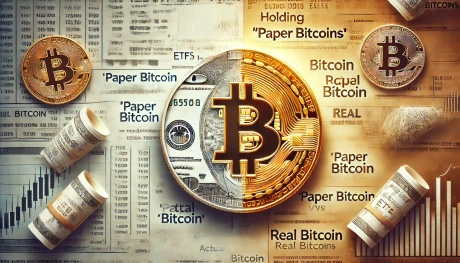Grayscale Met With The SEC, Tried To Convince Them To Turn The GBTC Into An ETF
Will GBTC get to become the first US-based spot bitcoin ETF? The euphoria from six months ago turned into Grayscale hinting that it might sue the SEC if its request is denied. Currently, the climate dictates that the answer will probably be negative, but the company is not giving up. According to CNBC, Grayscale “met privately with the Securities and Exchange Commission last week in an effort to persuade the regulator to approve the conversion of its flagship fund into an ETF.” Related Reading | Grayscale Removes Bancor (BNT) And Universal Market Access (UMA) From Its DeFi Fund The Grayscale Bitcoin Trust, also known as GBTC, “holds roughly 3.4% of the world’s bitcoin and is owned by more than 850,000 U.S. accounts, according to Grayscale.” For more than a year it has traded at around a 25% discount to BTC’s price. According to Grayscale, at the moment that the SEC approves the product’s transformation into an ETF, the discount will end and it will unlock “up to $8 billion in value for investors.” Take into account that VanEck’s, BlockFi’s, and other recent applications for a spot bitcoin ETF have been rejected. And that Grayscale has been applying to get one since 2017. This time around, the SEC has until July 6th to approve or deny the GBTC application. What Would Happen If The GBTC Turns Into An ETF To answer this question, Grayscale made “a 24-page presentation” for the SEC. Some graphs from the document are in the CNBC report, although in low resolution. In general, the GBTC’s transformation into a spot bitcoin ETF “would open them up to ordinary investors in a familiar wrapper that trades like a stock.” The main argument from Grayscale is that a bitcoin futures ETF already exists, and the “SEC is discriminating against issuers” by not letting any company create a spot bitcoin ETF. “ Grayscale contended that a spot bitcoin ETF is “no riskier” than futures-based ETFs, because the two markets are both affected by the underlying price of bitcoin and track each other closely.” Back in April Grayscale’s CEO, Michael Sonnenshein, felt more litigious when he said: “If the SEC can’t look at two like issues, the futures ETF and the spot ETF, through the same lens, then it is, in fact, potentially grounds for an Administrative Procedure Act violation.” The SEC visit and the threat of legal action have not been Grayscale’s only weapon. According to CNBC, to help transform the GBTC into an ETF, “the investment firm has helped coordinate a public letter-writing push, flooding the SEC with more than 3,000 letters in support of its application.” GBTC price chart on FTX | Source: GBTC/USD on TradingView.com How Would A Spot Bitcoin ETF Affect The Market? Opinions vary. There are institutions that can’t invest in bitcoin as an asset, but could definitely put their money in an ETF. Some believe that the sudden influx of funds that these people would bring would send bitcoin’s price to the moon. Unlike a future ETF which only holds future contracts, a spot ETF would have to buy the bitcoin it’ll represent. So, the money would definitely enter the bitcoin ecosystem. Related Reading | SEC, Ripple Agree To Extend Legal Battle Until 2023; XRP Bears The Brunt Of Case On the other hand, Bitcoiners don’t see what they deem as “paper bitcoin” with good eyes. The financial instrument would represent bitcoin, but the ETF isn’t the asset per se. This brings forth certain vulnerabilities to the bitcoin network. The “paper bitcoin” could be considered inflation and something akin to fractional reserve banking is technically possible. In any case, neither group has the finger on the trigger. The SEC and only the SEC does. Featured Image by Aymanejed on Pixabay | Charts by TradingView





